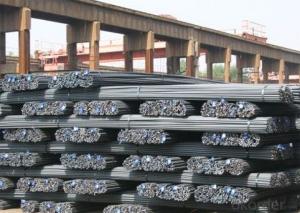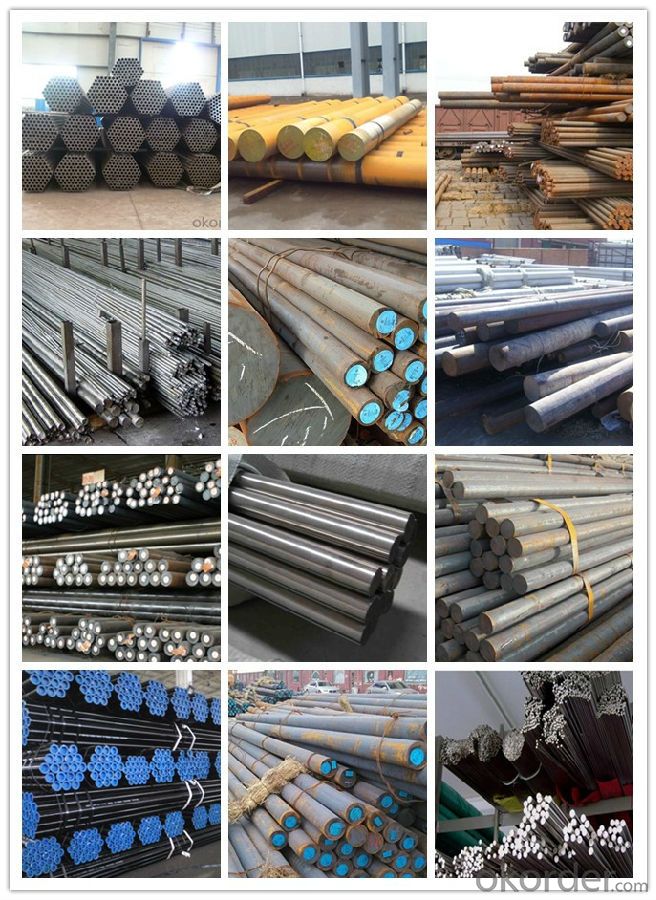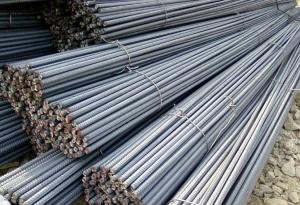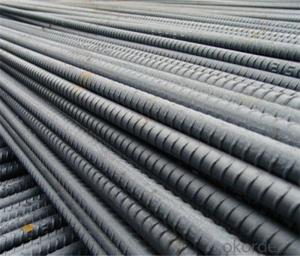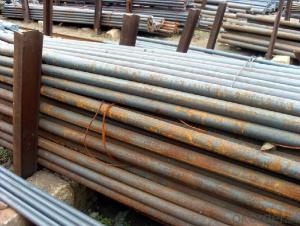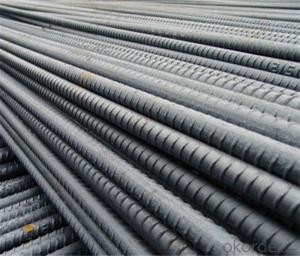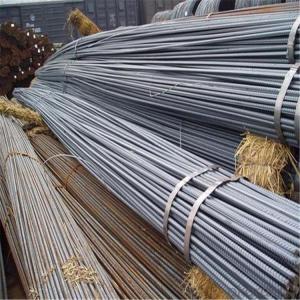Rebar Deformed Bar Steel Construction Steel Rebar
- Loading Port:
- China main port
- Payment Terms:
- TT OR LC
- Min Order Qty:
- 30 m.t.
- Supply Capability:
- 10000 m.t./month
OKorder Service Pledge
OKorder Financial Service
You Might Also Like
Specification
Product Introduction
| 1.Specification | ||||||
| Deformed steel bar | Diameter(mm) | Length (mm) | ||||
| 6~50 | 3000~9000 | |||||
| *Specification can be customized for sure. | ||||||
| 2.Chemical Compositons | ||||||
| Grade | C | Si | Mn | P | S | CEQ |
| HRB335 | 0.25 | 0.8 | 1.6 | 0.045 | 0.045 | 0.52 |
| HRB400 | 0.25 | 0.8 | 1.6 | 0.045 | 0.045 | 0.54 |
| HRB500 | 0.25 | 0.8 | 1.6 | 0.045 | 0.045 | 0.55 |
| 3.Delivery Conditions | ||||||
| Hot forged +Rough machined (black surface after Q/T)+ Turned (optional) | ||||||
| 4.Typical Applications | ||||||
| a.Construction of all types of concrete use | ||||||
| b.Bridge&Road&Building | ||||||
Product show
Workshop show
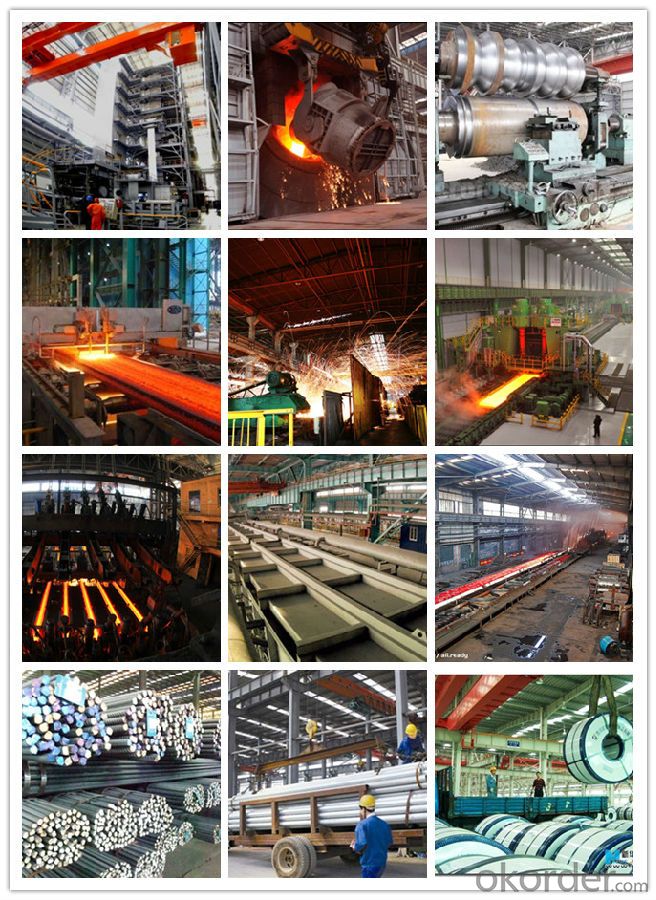
Shipping
1. FedEx/DHL/UPS/TNT for samples, Door-to-Door;
2. By Air or by Sea for batch goods, for FCL; Airport/ Port receiving;
3. Customers specifying freight forwarders or negotiable shipping methods!
Delivery Time: 3-7 days for samples; 5-25 days for batch goods.
Payment Terms
1.Payment: T/T, L/C, Western Union, MoneyGram,PayPal; 30% deposits; 70% balance before delivery.
2.MOQ: 1pcs
3.Warranty : 3 years
4.Package Informations: 1) EXPORT, In 20 feet (GW 25 ton) or 40 feet Container (GW 25 ton)
2)as customer's requirement
Why choose us?
(1) The leading exporter in China special steel industry.
(2) Large stocks for various sizes, fast delivery date.
(3) Good business relationship with China famous factories.
(4) More than 7 years steel exporting experience.
(5) Good after-sales service guarantee.
- Q: What are the environmental impacts of manufacturing special steel?
- Manufacturing special steel has significant environmental impacts due to its energy-intensive production process and the extraction of raw materials. The production of special steel requires high temperatures and uses large amounts of fossil fuel-based energy, resulting in substantial greenhouse gas emissions contributing to climate change. Additionally, the extraction of iron ore and other raw materials for steel production can lead to deforestation, habitat destruction, and water pollution. The disposal of steel waste and byproducts also poses challenges, as it can contaminate soil and water sources. Therefore, the environmental impacts of manufacturing special steel must be carefully managed and mitigated through sustainable practices and technologies.
- Q: What are the different methods of joining special steel components?
- Various techniques exist for joining special steel components, each offering unique advantages and applications. Welding, brazing, soldering, mechanical fastening, and adhesive bonding are among the most commonly used methods. 1. Welding represents a widely employed method for joining special steel components. It involves melting the base metals and adding a filler material to create a robust bond. Depending on the specific requirements and properties of the steel components, different welding techniques like arc welding, gas welding, or laser welding can be utilized. 2. Brazing utilizes a filler material with a lower melting point than the base metals. This material is heated and distributed between the components, forming a strong bond as it solidifies. Brazing is particularly suitable for high-temperature applications and can be performed using a torch, furnace, or induction heating. 3. Soldering is similar to brazing but employs a lower melting point filler material known as solder. It finds common use in electrical and electronic applications, as well as for joining small or delicate steel components. Soldering necessitates less heat and can be accomplished using a soldering iron or hot air gun. 4. Mechanical fastening involves joining components using mechanical means such as screws, bolts, nuts, or rivets. This method is often preferred when disassembly or reassembly is necessary, as it allows for easy removal and replacement of components. Mechanical fastening is suitable for applications requiring a strong and reliable joint, especially when welding or brazing may not be feasible. 5. Adhesive bonding is another method employed for joining special steel components. It entails applying an adhesive material to the mating surfaces, which then cures or hardens to create a robust bond. Adhesive bonding is commonly used when a continuous joint is required or when joining dissimilar materials. It offers advantages in applications necessitating vibration damping or sealing. The selection of the appropriate joining method depends on various factors such as the specific requirements of the application, the properties of the steel components, and the desired strength and durability of the joint. Each method has its own strengths and limitations.
- Q: What are the main factors affecting the creep rupture strength of special steel?
- The main factors affecting the creep rupture strength of special steel can be categorized into several key parameters. 1. Temperature: Creep rupture strength is highly dependent on the temperature at which the steel is operating. Higher temperatures can significantly reduce the creep rupture strength of special steel due to the increased atomic diffusion and dislocation movement, leading to accelerated deformation and eventual failure. 2. Time: Creep rupture strength is also influenced by the time duration of the applied load. Creep is a time-dependent phenomenon, meaning that the longer the steel is subjected to stress, the more likely it is to experience rupture. The relationship between time and creep rupture strength is typically described by a power law equation, where longer durations result in lower rupture strength. 3. Stress Level: The applied stress level is a critical factor affecting creep rupture strength. Higher levels of stress can cause faster deformation and reduce the time to rupture. Therefore, it is important to ensure that the stress level applied to special steel is within the acceptable range to maintain its desired creep rupture strength. 4. Microstructure: The microstructure of special steel plays a crucial role in determining its creep rupture strength. Factors such as grain size, grain boundary characteristics, and the presence of alloying elements can all influence the steel's resistance to creep deformation and rupture. Fine-grained microstructures with a high density of grain boundaries tend to exhibit better creep resistance and higher rupture strength. 5. Composition: The chemical composition of special steel can significantly impact its creep rupture strength. The addition of certain alloying elements, such as chromium, molybdenum, and vanadium, can enhance the steel's high-temperature strength and resistance to creep deformation. These elements form stable carbides, which impede the movement of dislocations and improve the material's creep rupture strength. 6. Heat Treatment: The heat treatment process used to modify the microstructure of special steel can also affect its creep rupture strength. Proper heat treatment can optimize the grain size, distribution of alloying elements, and overall microstructure, resulting in improved creep resistance and higher rupture strength. Overall, the main factors affecting the creep rupture strength of special steel include temperature, time, stress level, microstructure, composition, and heat treatment. Understanding and controlling these parameters is crucial in ensuring the desired performance and reliability of special steel in high-temperature and long-term applications.
- Q: How does the hardness of special steel affect its performance?
- The performance of special steel is heavily influenced by its hardness, which is determined by its ability to resist indentation, scratching, or deformation. This property is directly linked to the steel's microstructure and carbon content. When special steel is hardened, it goes through a heat treatment process, which typically involves rapid cooling or quenching after being heated to high temperatures. This process alters the steel's microstructure, resulting in a harder material. The increased hardness brings several advantages to the performance of special steel. Firstly, a higher level of hardness enhances the wear resistance of special steel. This is particularly important in applications where the steel is exposed to abrasive or erosive forces, such as cutting tools or machinery components. A harder steel can endure these forces without significant wear or damage, leading to improved longevity and reliability. Secondly, the hardness of special steel affects its strength and toughness. A harder steel generally exhibits higher strength, enabling it to withstand greater forces without permanent deformation or failure. This property is beneficial in applications where the steel faces heavy loads or impacts. Additionally, a certain level of toughness is necessary to prevent brittle fractures. While high hardness can make a steel more brittle, careful heat treatment can strike a balance between hardness and toughness, ensuring the steel remains strong and resistant to fracture. Furthermore, the hardness of special steel also influences its machinability. Hardened steel can be more difficult to machine due to its increased resistance to cutting tools. However, it offers greater dimensional stability and precision during machining operations, resulting in more accurate and consistent results. In conclusion, the hardness of special steel has a significant impact on its performance. A higher level of hardness provides improved wear resistance, strength, and toughness, making it suitable for demanding applications. However, it is crucial to carefully consider the balance between hardness and toughness to avoid brittleness. Therefore, understanding and controlling the hardness of special steel is essential for optimizing its performance in various industries.
- Q: What are the different heat treatment defects in special steel?
- There are several heat treatment defects that can occur in special steel during the heat treatment process. Some of the most common defects include: 1. Decarburization: This occurs when the surface layers of the steel lose carbon due to exposure to high temperatures in an oxygen-rich environment. Decarburization can lead to reduced hardness and strength in the treated steel. 2. Quench cracking: Also known as cracking during quenching, this defect occurs when the steel undergoes rapid cooling after being heated. The differential cooling rates can cause internal stresses, leading to cracks in the material. 3. Distortion: Distortion refers to the change in shape or dimension of the steel during the heat treatment process. It can occur due to non-uniform heating or cooling, inadequate fixturing, or improper quenching techniques. 4. Soft spots: Soft spots are localized areas of reduced hardness in the treated steel. These spots can occur due to insufficient heating or improper quenching, leading to reduced mechanical strength in those areas. 5. Overheating: Overheating is a defect that occurs when the steel is exposed to excessively high temperatures during the heat treatment process. This can result in grain growth, reduced toughness, and decreased overall material properties. 6. Case hardening problems: Special steels often undergo case hardening processes, such as carburizing or nitriding, to create a hard outer layer. However, several defects can occur during these processes, including insufficient or excessive hardening, poor case depth, or uneven hardness distribution. 7. Residual stresses: Residual stresses are internal stresses that remain in the steel after the heat treatment process. These stresses can lead to dimensional instability, warping, or even cracking if not properly controlled. To avoid or minimize these heat treatment defects, it is crucial to follow proper heat treatment procedures, including precise temperature control, adequate cooling rates, and appropriate fixturing techniques. Additionally, using high-quality heat treatment equipment, monitoring the process closely, and conducting thorough inspections can help detect and address any potential defects in special steel.
- Q: Can special steel be used in the production of kitchen utensils?
- Kitchen utensils can benefit from the use of special steel. This term refers to steel alloys with specific properties, including resistance to corrosion, high strength, and durability. These qualities make special steel suitable for various applications, including the production of kitchen utensils. To meet the demands of regular use, exposure to water, and high temperatures, kitchen utensils require a robust material. Special steel, such as stainless steel, is commonly used for this purpose due to its resistance to corrosion and ability to withstand heat. Stainless steel utensils are widely recognized for their durability, rust resistance, and ease of cleaning. Apart from stainless steel, there are other types of special steel suitable for kitchen utensils. For instance, high carbon steel is often employed in the production of chef knives due to its sharpness and strength retention. Additionally, titanium-coated steel utensils are available, offering benefits like non-stick properties and enhanced durability. In conclusion, special steel provides versatility in the production of various kitchen utensils. Its outstanding properties make it an ideal choice for manufacturers aiming to deliver durable and high-quality products capable of enduring the demands of everyday kitchen use.
- Q: What are the main applications of special steel in the defense equipment?
- Special steel is widely used in defense equipment due to its exceptional properties such as high strength, durability, and corrosion resistance. It finds applications in various defense equipment including tanks, submarines, aircraft carriers, missile systems, armored vehicles, and military aircraft. Special steel is crucial for manufacturing components like armor plates, missile casings, propeller shafts, gun barrels, and other critical parts that require enhanced performance and reliability. Its usage ensures the defense equipment can withstand extreme conditions, resist wear and tear, and provide optimum protection and functionality to the armed forces.
- Q: What are the characteristics of special stainless steel?
- Special stainless steel distinguishes itself from regular stainless steel through its exceptional properties. Some of the notable traits of this type of stainless steel are as follows: 1. Unparalleled Resistance to Corrosion: Unlike regular stainless steel, special stainless steel boasts a higher degree of corrosion resistance. It can endure exposure to harsh surroundings, such as saltwater or acidic substances, without undergoing corrosion or deterioration. 2. Impressive Endurance of High Temperatures: Special stainless steel is engineered to withstand elevated temperatures without compromising its structural integrity. This makes it suitable for industries like aerospace, automotive, and power generation, where extreme heat endurance is essential. 3. Reinforced Strength and Durability: Special stainless steel is commonly alloyed with other elements to enhance its strength and durability. Consequently, it exhibits remarkable resistance to deformation, cracking, and wear, ensuring its longevity and reliability in demanding conditions. 4. Exceptional Mechanical Properties: Special stainless steel possesses outstanding mechanical properties, including high tensile strength, toughness, and ductility. These properties make it an ideal choice for applications that require a high load-bearing capacity, such as structural components and machinery. 5. Distinctive Magnetic Properties: Depending on its composition, special stainless steel can display a range of magnetic properties, varying from non-magnetic to highly magnetic. This versatility enables its use in applications that demand magnetic properties, such as magnetic resonance imaging (MRI) machines or electrical transformers. 6. Hygienic and Easy to Maintain: Special stainless steel is renowned for its hygienic properties, rendering it suitable for applications in the food and healthcare industries. It is non-porous, resistant to bacterial growth, and easy to clean, making it an ideal choice for equipment and surfaces that must meet stringent sanitary standards. 7. Aesthetic Allure: The aesthetic appeal of special stainless steel often leads to its utilization in architectural and design applications. It can be polished to achieve a mirror-like finish, lending it a sleek and contemporary appearance. Moreover, its malleability and weldability allow for limitless creative design possibilities. In conclusion, special stainless steel possesses an array of exceptional properties, encompassing high corrosion resistance, temperature resistance, strength, durability, excellent mechanical properties, unique magnetic properties, hygienic features, and aesthetic appeal. These characteristics position it as the preferred choice for a wide range of industrial, commercial, and domestic applications.
- Q: What are the main characteristics of tool steel?
- Tool steel, a specialized type of steel, is specifically engineered for the manufacturing of tools such as drills, dies, and cutting instruments. It boasts several key attributes that render it suitable for these applications. Primarily, tool steel is renowned for its exceptional hardness. It contains a substantial amount of carbon, typically ranging from 0.5% to 1.5%, which contributes to its hardness. This hardness enables tool steel to withstand wear and abrasion, making it perfect for cutting and shaping materials. Another crucial characteristic of tool steel is its remarkable toughness. It possesses the ability to endure high impact and shock loads without fracturing or breaking. This toughness is vital in tooling applications where tools are subjected to heavy loads and forces. Tool steel also exhibits superb heat resistance. It possesses a high melting point, allowing it to retain its strength and hardness even at elevated temperatures. This heat resistance is essential in applications where tools are exposed to high temperatures during cutting or shaping processes. Furthermore, tool steel possesses excellent dimensional stability and machinability. It experiences minimal distortion and shrinkage during heat treatment, ensuring that the tool retains its shape and size. Additionally, tool steel is easily machined, enabling the production of intricate shapes and designs. Overall, the prominent characteristics of tool steel encompass high hardness, toughness, heat resistance, dimensional stability, and machinability. These properties establish tool steel as an ideal material for the production of tools that necessitate high strength, durability, and performance.
- Q: How does special steel contribute to electrical conductivity?
- Special steel, also referred to as electrical steel or silicon steel, plays a vital role in enhancing electrical conductivity by reducing electrical losses during the transmission and distribution of electrical power. It achieves this by diminishing eddy current losses and hysteresis losses that arise when an alternating current (AC) flows through a magnetic material. The chemical composition of special steel is a key factor in its high conductivity. It is alloyed with specific elements, such as silicon, which enhances its magnetic properties and decreases its electrical resistance. The addition of silicon increases the electrical resistivity of the steel, making it suitable for applications that require efficient electrical conduction with minimal energy loss. Additionally, special steel is manufactured with a carefully controlled grain structure, aligning the crystals in a specific orientation. This alignment, known as grain-oriented, enables the steel to exhibit superior magnetic properties and efficient electrical conduction. It also reduces magnetic losses when the magnetic field changes direction, further improving overall electrical conductivity. The exceptional properties of special steel make it an ideal choice for various electrical applications, including transformer cores, electric motors, generators, and other electromagnetic devices. Its high electrical conductivity ensures minimal energy loss during the transmission and distribution of electricity, resulting in more efficient and cost-effective electrical systems. In conclusion, special steel significantly contributes to electrical conductivity by minimizing electrical losses through its specific chemical composition and grain structure. Its low electrical resistance and superior magnetic properties make it an essential material for optimizing energy efficiency in electrical systems.
Send your message to us
Rebar Deformed Bar Steel Construction Steel Rebar
- Loading Port:
- China main port
- Payment Terms:
- TT OR LC
- Min Order Qty:
- 30 m.t.
- Supply Capability:
- 10000 m.t./month
OKorder Service Pledge
OKorder Financial Service
Similar products
Hot products
Hot Searches
Related keywords
